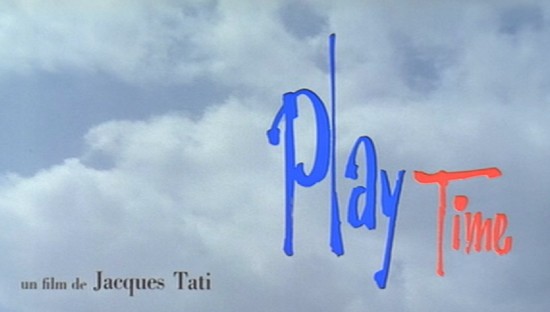Revisit: Play Time

A Jolly Film/Specta Films/Continental Motion Pictures release 1967
Directed by Jacques Tati
Writing credits:
Art Buchwald
Jacques Lagrange
Jacques Tati
Monsieur Hulot (Jacques Tati) has to contact an American official in Paris, but he gets lost in the maze of modern architecture which is filled with the latest technical gadgets. Caught in the chaos of a tourist invasion, Hulot roams around Paris with a group of Americans.
Godard once called Tati Frances best comedic director, saying, "Everything interests Tati...anything which is real, bizarre, or charming." Likewise, Truffaut distinguished Tati as one of the nine major auteurs.
Tati got his start as a filmmaker just before the rise of the French New Wave, but can be linked to the movement in many ways. Despite his hyper-control over image and use of major studio budgets, Tati and the New Wave shared common interest in the urban economics of Paris, the transformation of leisure and work times, as well as a love for silent comedy.
Mixing Charlie Chaplin's social awareness and comic ability to transform objects through imagination with Buster Keaton's oft-victimized, gentleman-like demeanor, Tati created M.Hulot, the bumbling protagonist of Play Time and several of Tati's other films. However, the true star of this film is Tati's vision of Paris. Play Time took over three million dollars and thirteen years to make; Tati built his own city for the film. It's a dream-like landscape formed by technology, hyper-modern yet barely functional. The film is absolutely beautiful, shot on 70mm to exhibit Tati's attention to detail.
Lucy Fishr compares Tati's films to children's games. Essentially they are puzzles with multiple centers of action. Often times gags are incomplete, eliptical, or played on the audience. The result is a film that deconstructs filming language. Tati employs many Brechtian techniques that function in this way as well. Take the opening sequence - a lack of a clear setting, protagonist, or form of contiguous editing de-establishes the establishing shot. Likewise, Tati's use of sound is incredibly overt; each diagetic sound is extacted and emphasized, like a sort of aural close-up, while dialogue is reduced to chatter, the mere idea of people talking.
Play Time is one of my favorite films, the kind that makes you rethink the cinema. Criterion just reissued their excellent DVD version - definitely check it out!

No comments:
Post a Comment